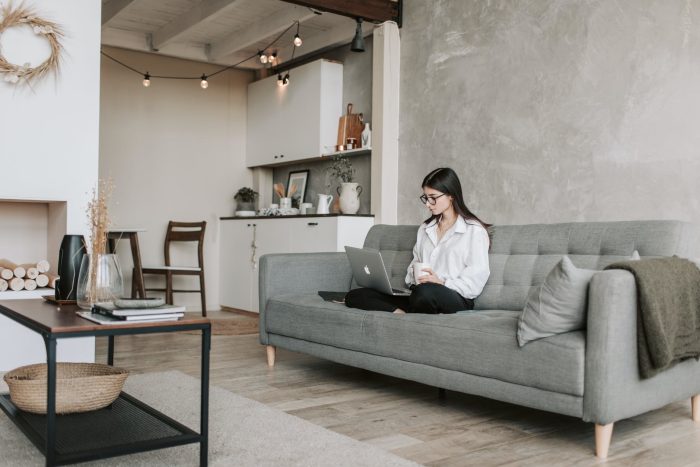Five Things That Can Improve Your Personal Growth Through A Minimalist Lifestyle
Minimalism is more than a buzzword used in architecture and interior design. In fact, minimalism has become a lifestyle, now often associated with the intention to simplify one’s existence and minimize any distractions that might deter a person from achieving goals or improving personal growth.
While minimalism takes months, perhaps even years to practice and perfect, in fact, research suggests that people who adopt a minimalist lifestyle often lead more spiritual and self-fulfilled lives. They tend to be less stressed and generally experience an improvement in their financial health.
Ultimately, it’s possible that living a more minimalist lifestyle or adopting such a mindset helps to increase our happiness, but also helps us to prioritize the things in our life that help to add value to our reality.
However, learning new habits, any habit for that matter, can be a tedious undertaking. In a time where everyone is constantly rushed and pressed to get as much done as possible, having the ability to practice minimalism, whether it’s spending less money or minimizing your need for digital devices – reductive habits require patience and truly understanding oneself.
Building self-improvement through minimalism
Academia explains personal growth as the process of self-improvement, through which a person can enhance their strengths, improve their mental well-being, and also rebuild their relationships.
Just as minimalism can look different from person to person, so does personal growth. Often we might share commonalities with others, but ultimately the goal is to foster healthy habits that can lead to improved self-awareness and more effective methods to help simplify the task of making daily decisions and resolving problems.
With fewer possessions, you have less to care for
One of the key elements of adopting a minimalist mindset is embracing a more simplified lifestyle, including living with fewer possessions.
When we have fewer possessions or objects to care for, we automatically free up more of our personal time. This enables us to give more time back to ourselves instead of having to oversee the maintenance of different things in our lives that do not add value.
Think of it as having a car that constantly needs repairs or undergo engine service. The more of these little car-related problems you have, the more time you spend getting them resolved, the more money you’re wasting, and the more it leads to bigger frustrations.
When our possessions begin to dictate our time, it no longer becomes a possession of need but rather wants, taking up time and space that could be used more effectively.
With less to care for, we have more free time
As we begin to clean and declutter our lives, we not only remove barriers or obstacles that might stand between us and our personal growth, we begin to make more time for ourselves.
By removing the things you consider distractions in your home, whether it’s your television, an old gaming console, or perhaps even countless books that have been read several years back, we create space in the physical and mental space.
With fewer things to care for, maintain, or even clean, we have more free time, even if it’s several minutes per day extra. These extra minutes accumulate to several hours, and even days over the long term.
With more free time, we can focus on our personal growth
As we steadily increase the ability to spend more time on the things and people we feel create value in our lives, we begin to create a pathway through which we can discover the things we enjoy and the company we like to keep around.
Now that we have more time, we can start by doing things we’ve always wanted to undertake but never had the chance to do. Learning new skills or even revisiting skills we’ve forgotten over time. Taking up an extra hobby or maybe starting a side hustle to help generate some income.
Whatever you decide to fill this time with, make it well worth the effort. Ensure these things can make a difference and contribute to your self-improvement.
Having more time, whether a couple of hours after work or even before the day starts, leaves enough space to simplify the logistics of our daily routine. This can help create more space for us to think, focus on our goals, and align our energy with a bigger purpose.
With more personal growth, we become more self-aware
Over time, as we steadily have cleared up our lives, decluttered our homes, and sold-off things that no longer serve us, we’re creating room for improvement through the ability to learn and adapt.
These efforts take some time to perfect; however, this mustn’t come without the ability to be more self-aware of the things we do, the people we interact with, the jobs we have, or even the food we eat.
Being more self-aware of these things, whatever they may be, can lead to other things. In some instances, people more self-aware of their spending habits will often save more money, minimizing the ability to splurge on unnecessary purchases and buy more possessions.
Another example could be how being more self-aware of the food you eat daily can lead to other healthy habits; whether to cut down on certain products, or even a specific consumable, the small adjustments we make can have a long-term effect on us.
With more self-awareness, we build a mindset of intentional habits
Throughout the journey, we’ve discovered that cleaning out the possessions that keep us from our goals has helped direct us onto a path through which we can improve, learn new abilities, and ultimately lead to greater self-awareness.
At the final step, we are approaching the ability to foster a mindset of intentional habits. Being more intentional with everything we do leads to greater contributions to our well-being and overall growth.
If we’re intentional about what we buy at the store, we’ll no longer be misguided by consumer culture. Quality becomes more important than quantity, which we can apply in everything we do in our lives, even with friends and family.
Being more intentional encourages us to clearly understand the situation or object that might be standing in front of us. We know this might affect us and how it could alter our personal growth. The more we make intentional decisions, the less we need in our lives, as we’re focused on our goals and improving our abilities.
The bottom line
A lot of good can come from living a less cluttered and potentially more organized lifestyle. Focusing on what we know is important to us will help us find the right path to improving ourselves, leading to better personal growth.
Remember not to be too hard on yourself; take it day and night, step-by-step. Every person might view minimalism and personal growth differently, so find a balance that works with what you’re looking to achieve and what you can do to be more intentional with the things you do, buy, and the people you surround yourself with.












Read 0 comments and reply